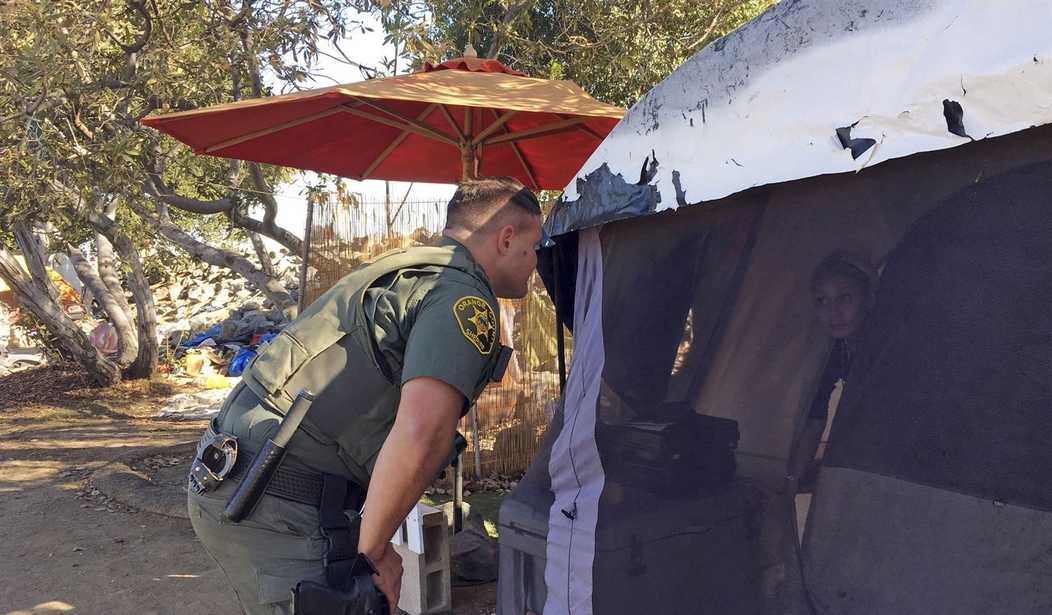The Boise decision has had a huge impact on the entire west coast of the US. This 2018 ruling from the 9th Circuit said that not only could states not criminalize homelessness, they could not criminalize the results of homelessness. That meant you couldn’t arrest someone for sleeping in a tent on the sidewalk or in a public park.
Cities impacted by this decision have been trying to overturn it since it was issued but the way this has worked out in practice is that cities cannot remove a homeless person unless they have a shelter bed to offer them. And even that becomes tricky because most cities have more homeless people than beds precisely because many of the homeless routinely refuse offers of shelter. So even when there are many more homeless people than beds, many of the beds are empty on any given night.
And this is where a legal question arises. If a homeless person rejects an offer of shelter are they then homeless voluntarily? That’s the argument that cities have been making in a case that the Supreme Court may take up soon.
…officials representing city and state governments argue that people living on the streets who decline an offer to relocate to a temporary shelter are therefore there by choice — in other words, that they are “voluntarily homeless.”
That’s because a body of case law dealing with the rights of homeless people hinges on this concept of whether a person’s conduct is “voluntary.” Courts have largely found that punishing someone for an involuntary status like homelessness violates the Eighth Amendment’s prohibition on cruel and unusual punishment…
“Many people experiencing homelessness strictly refuse shelter and instead prefer to remain on public property,” the homelessness coordinator for Newport Beach (Orange County) wrote in a declaration to the court, while acknowledging in the same document that homeless residents there are offered shelter not in Newport Beach but in nearby Costa Mesa.
The Orange County city of Garden Grove doesn’t have any shelter beds to offer, yet expressed its frustration in a brief to the Supreme Court at how “extremely challenging” it is to “address individuals who refuse shelter” or services.
Jenkins — and the officials seeking answers from judges — might be correct that there are people on the streets who turn down legitimate offers of shelter. The challenge, though, is what standards those officials must apply to determine when they can take action against someone. Are there circumstances when a person’s decision to stay outside is reasonable and acceptable?
The SF Chronicle brings up some counter-arguments for why some people might reject offers of help. What if the person doesn’t want to forfeit their belongings to enter a shelter? What if they don’t want to be transported to another city? What if they have a pet the shelter won’t accept? What if the shelter is religious and they don’t identify with that faith?
It seems to me that the old adage “beggars can’t be choosers” ought to apply here, at least in most cases. For instance, what does it matter if the available shelter bed is in Newport Beach or in Costa Mesa (which is an adjoining city)? Does someone who pitches a tent in Newport Beach suddenly become entitled to stay there? What if they’re actually from Colorado? What exactly makes them a Newport Beach resident if they don’t rent or own property there? Is it a feeling?
Most shelters won’t allow people to bring in a shopping cart full of belongings. Is that a good reason to remain outside? As for pets, I realize some homeless people have them but it seems questionable. Should someone who can’t take care of themselves be taking care of a dependent animal? Even if you think that’s a good reason to refuse shelter it doesn’t change the fact that, having made that decision, you’re outside by choice not by necessity.
Finally, what’s missing from this list of reasons for refusing shelter is a reason that shouldn’t be overlooked. Shelters come with rules and expectations about drug and alcohol use. Many of these people would rather be outside close to the drugs and the dealers. Not all of them certainly but many of the people who’ve been on the streets long term are there for the drugs. Some of them will tell you so if you ask.
This experiment in letting homeless people live outside the law has gone on long enough. People shouldn’t be criminalized for circumstances beyond their control, but when they reject offers of help the hands of cities and states shouldn’t remain tied forever. Hopefully the Supreme Court will straighten out the Boise decision so cities on the west coast can go back to cleaning up the streets.







Join the conversation as a VIP Member